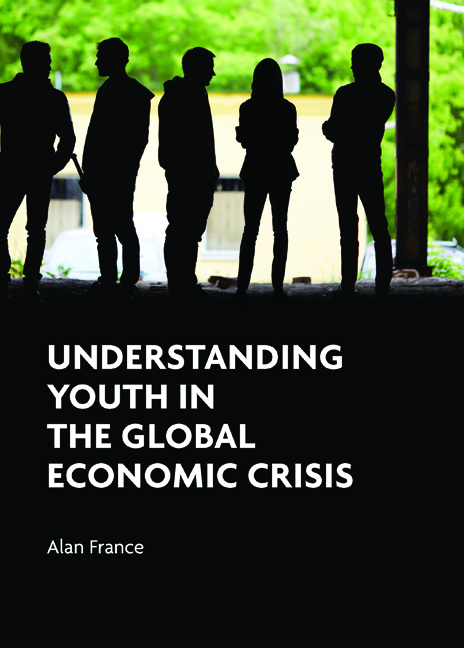Book contents
- Frontmatter
- Dedication
- Contents
- List of tables and figures
- About the author
- Acknowledgements
- Introduction
- One A political ecology of youth
- Two The global crisis and the ‘age of austerity’
- Three Education and training: the broken promise
- Four Education and training: from public good to private responsibility
- Five Unemployment and work: precarious futures
- Six NEETs and the disengaged: the ‘new’ youth problem
- Seven Divergence and difference: contrasting cross-national experiences of being young
- Eight Education, work and welfare in diverse settings
- Nine Youth and mobility: inequality, leaving home and the question of youth migration
- Ten After the crisis: social change and what it means to be young
- References
- Index
Five - Unemployment and work: precarious futures
Published online by Cambridge University Press: 01 September 2022
- Frontmatter
- Dedication
- Contents
- List of tables and figures
- About the author
- Acknowledgements
- Introduction
- One A political ecology of youth
- Two The global crisis and the ‘age of austerity’
- Three Education and training: the broken promise
- Four Education and training: from public good to private responsibility
- Five Unemployment and work: precarious futures
- Six NEETs and the disengaged: the ‘new’ youth problem
- Seven Divergence and difference: contrasting cross-national experiences of being young
- Eight Education, work and welfare in diverse settings
- Nine Youth and mobility: inequality, leaving home and the question of youth migration
- Ten After the crisis: social change and what it means to be young
- References
- Index
Summary
Introduction
In Chapters Three and Four we concentrated on education and training, highlighting how Australian New Zealand, Canadian and UK efforts to respond to the growing concerns about skills shortages in the 1990s saw governments try to improve the ‘human capital’ of the young. In this chapter we turn our attention to young people's relationship with paid work. Getting into paid work has always been a focal point in young people's movement into independent adulthood and citizenship (Roberts, 2003; Jones, 2009). As a field of practice, paid employment has its own rules, regulations and social practices that shape young people's transitions and trajectories (Atkinson, 2010). The ways in which these relationships are established, changed and shaped, especially for the young, have their roots in historical and contemporary processes embedded in the macro, meso and exosystems of social and economic policy and the practices of corporate business and capitalism (Mortimer, 2009, p.149).
Being ‘in work’ or ‘out of work’ puts young people into different sets of social relationships, especially around access to social resources and opportunities that can determine their future in the social structure (France et al, 2012; Shildrick et al, 2012). Moving from education into the world of work or into and through unemployment shapes both the present life worlds of individuals and their future trajectories (Atkinson, 2010; Shildrick et al, 2012). Work and paid employment are ‘force fields’ (Bourdieu, 1998, p.40) that can protect the young and help them to become more independent, self-reliant and socially mobile (Atkinson, 2010). They provide a critical site of social practice where habitus and cultural and social capital can play a significant part in helping young people manage their social and economic futures (Atkinson, 2010).
- Type
- Chapter
- Information
- Understanding Youth in the Global Economic Crisis , pp. 109 - 134Publisher: Bristol University PressPrint publication year: 2016



